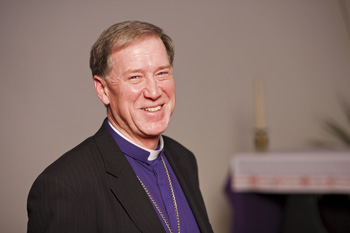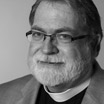Some weeks ago before the gathering of Primates in Canterbury I wrote about the proposed changes to the Anglican Church of Canada’s (ACoC) doctrine of marriage. The Report “This Holy Estate” and the draft resolution which accompanies it would change the Marriage Canon to provide a liturgy for same sex couples wishing to be married by the Church. The Report and the canonical change are before the ACoC 2016 General Synod for decision.
But the Canadian House of Bishops have been meeting with Archbishop Fred Hiltz who was present at the January Canterbury gathering of the Primates. Archbishop Hiltz was present during the Primates’ discussions of “relational consequences” for The Episcopal Church’s (TEC) changing its marriage canon by authorizing rites for same sex marriage at its July 2015 General Convention. According to the statement the Canadian Bishops released yesterday (February 29), they heard a “moving and intimate account” by Archbishop Hiltz’ on that meeting. With regards to the changes they were contemplating to their own Marriage Canon, along the same lines as TEC, the Bishops released the following statement:
“…it became clear to us that the draft resolution to change the Marriage Canon to accommodate the marriage of same-sex partners is not likely to pass in the Order of Bishops by the canonical requirement of a 2/3rds majority in each Order. Some of us talked of being mortified and devastated by this realisation. We feel obliged to share this with the Council of General Synod as they give consideration to the process for handling this resolution at General Synod. We have grappled with this issue for three meetings of the House, and we feel a responsibility to convey our inability to come to a common mind in discerning what the Spirit is saying to the Church…”
The bishops also noted their regret that the Draft Resolution to change the Marriage canon, and their inability to do so at this time, has caused and will cause pain both within and beyond the Anglican Church of Canada (read it all here).
“The Bishops can’t do that!” said Dean Peter Wall of the Diocese of Niagara, co-chair of the Planning and Agenda Team for the Council of General Synod. In the very same day (February 29), he released a statement on behalf of the Planning and Agenda team for Synod:
“I do not believe that the work of the General Synod can be pre-empted by a meeting of the House of Bishops alone. It is when they meet as the Order of Bishops, in conversation with the Orders of Clergy and Laity, that bishops participate in the shared responsibility of all members of the General Synod to take a decision on this matter.”
So where does that leave the Anglican Church of Canada on the possibility of changing its doctrine of marriage, along the same lines as TEC?
- The Bishops left the door open to changing the doctrine of marriage piecemeal, by dioceses exercising “local option” to provide Church blessings for same-sex couples. “We continue to wonder whether a legislative procedure is the most helpful way of dealing with these matters,” they wrote, keeping the door open for the status quo to continue, for dioceses to establish “facts on the ground.”
- They committed the Anglican Church of Canada to further study of the matter: “In our deliberations, we affirmed a commitment to continuing conversations and engagement with the Report of the Commission on the Marriage Canon, and to achieving the greatest pastoral generosity possible.” We call this “kicking the can down the road.” It doesn’t address the problem—it merely postpones a decision that may already have been made. Are they waiting, perhaps, until the three years have passed for relational consequences on TEC? There are echoes here of the same language TEC used along the way—“generous pastoral provision”-that hint at an already projected outcome.
- The Bishops allowed other leaders within the Church to challenge their special responsibility to guard the faith, order and doctrine of the Church, without any reply to date. Bishops throughout the Communion of Anglican Churches have a well-recognized responsibility to teach, uphold and safeguard the faith and doctrine of the Church, and to order its worship and liturgical practices accordingly (see Principles of Canon law in the Churches of the Anglican Communion (2008), Principles 37.4, 48.3, 56.7-18 and 60.1). In the same way that the Archbishop of Canterbury has been slow, if not silent, to defend this responsibility of the Primates gathering in January, so the Canadian bishops have been silent in response to the challenge by the co-Chair of the Planning Team for the General Synod. This weakens the authority of bishops, in synod and out. Their silence raises the question “if bishops have not the authority to guard the faith, doctrine and order of the Church, who does?”
- Finally, by their own admission, these Canadian bishops are “unable to come to a common mind about what the Spirit is saying to the Church.” Really? From which “Spirit” are they seeking discernment? The Spirit of Jesus Christ, whose mind is undivided, as Paul so powerfully expounds in Philippians 2:5-11? The Spirit who inspired God’s revelation from creation, in Holy Scripture, that God created humanity “male and female” (Genesis 1:27) and that marriage is a holy estate between a man “who shall leave his father and mother” to be united to his wife so that “the two will become one flesh.” (Genesis 2:24)? Were they seeking discernment from the same Spirit who inspired Jesus to cite this ordinance in Matthew 19:5, and in the very next verse to emphasize its holiness and permanence by declaring “Therefore what God has joined together, let man not separate.” (Matt. 19:6)?
Or were they seeking discernment from some other Spirit, or the Spirit of the age?
The Holy Spirit who reigns with the Father and the Son from the beginning is the same Spirit who at creation hovered over the unformed depths and waters of creation. The Holy Spirit is the same Spirit who helped bring order out of that chaos. He is not the author of chaos. And he is certainly not responsible for the doctrinal chaos in the Anglican Church of Canada today.
The Rev. Canon Phil Ashey is President and CEO of the American Anglican Council.



